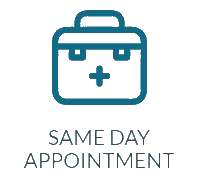Do I have a Sleep Disorder?

Do you often feel tired after getting a full night’s sleep? Is it difficult for you to fall asleep, or you wake up too early in the morning? These are just a few examples of different sleep disorders that many people will face at some point. The good news is most sleep disorders are manageable after diagnosing the underlying problem, putting you back on the path to getting deep, restorative sleep.
What Is a Sleep Disorder?
Humans spend about a third of their lives sleeping. Although researchers are still learning why our bodies require sleep, there’s no doubt that sleep is vital to rejuvenating our minds and bodies. Any condition that prevents you from reaching the recommended seven to nine hours of uninterrupted sleep is considered a sleep disorder.
What Are the Different Kinds of Sleep Disorders?
The most common sleep disorders include:
- Insomnia—When you have trouble falling asleep or going back to sleep after you wake up during the night
- Sleep Apnea—When your airway becomes blocked during sleep, interrupting your sleep cycles and causing drowsiness during the day
- Restless Leg Syndrome—Having trouble falling asleep because of an uncomfortable urge to move your legs
- Narcolepsy—Feeling tired most of the day and suddenly falling asleep at inappropriate times
- Circadian rhythm sleep disorders— affect people who travel (jet lag) and shift workers who have trouble adjusting to sleeping during the day. Additionally, parasomnia is an umbrella term defining various behaviors that disrupt sleep stages such as sleepwalking and nightmares.
Common symptoms of sleep disorders include excessive daytime drowsiness, uneven breathing patterns, poor mood, lack of concentration, and extreme body movements during sleep.
What Are the Long-Term Effects of Living with a Sleep Disorder?
Prolonged sleep deprivation can cause a downward spiral in your overall health. When you don’t get enough sleep each night, you face a greater chance of developing:
- Depression
- Impaired memory
- Weakened immune system
- Increased perception of pain
If you drive, the consequences of prolonged sleep deprivation can be dangerous. The National Highway Traffic Safety Administration (NHTSA) reported that driver fatigue was the cause of more than 83,000 automobile accidents from 2005 to 2009 and was responsible for 803 deaths in 2016. In fact, sleep-deprived participants in a driver simulation study performed as badly as those who were under the influence of alcohol.
The NHTSA recommends you avoid driving if you notice the following:
- You can’t quit yawning
- You can’t hold your head up
- You can’t keep your eyes focused
- You can’t concentrate on the road
- You drift out of your lane
How Can I Help Myself Get a Good Night’s Sleep?
If you have trouble falling asleep, try these tips to help your body get ready for sleep at night:
- Stick to a regular schedule for going to bed and waking up each day
- Avoid alcohol, caffeine, or nicotine at least four hours before going to bed
- Avoid exercising at least two hours before bedtime
- Don’t take a nap later than 3 p.m.
- Avoid heavy meals within two hours of going to bed
- Sleep in a cool, dark room
If you believe you have a sleep disorder, make an appointment today with Park Avenue Medical Professionals. Our physicians diagnose and treat all kinds of sleep disorders and offer outstanding, compassionate care.



